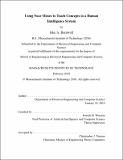Using near misses to teach concepts to a human intelligence system
Author(s)
Barnwell, Jake A. (Jake Allen)
DownloadFull printable version (1.230Mb)
Other Contributors
Massachusetts Institute of Technology. Department of Electrical Engineering and Computer Science.
Advisor
Patrick H. Winston.
Terms of use
Metadata
Show full item recordAbstract
If we are to understand how we can build artificial intelligence machines that are able to organically process and acquire knowledge like humans do, we must first understand how to teach a human intelligence system to model and learn generic concepts without resorting to mechanistic hand-coding of such concepts. Such an achievement in human intelligence is an important stride towards the realization of Minsky's hypothetical "baby machine." Genesis is a story-understanding system that reads and analyzes stories in simple English, as humans do. Genesis can recognize certain sequences of events as particular manifestations of some user-defined concepts, such as revenge or physical retaliation. However, both the structure and definition of these high-level concepts must be explicitly provided by the user, and must be exactly matched using concept patterns against sequences of events in a story. I propose that this paradigm is unlike how humans learn such concepts, and instead, such concepts are learned by example, not by explicit definition. To introduce this organic, example-driven paradigm to Genesis, I have created STUDENT, a system that ingests a small series of positive and negative examples of concepts and builds an internal model for these concepts. By aligning similar examples of concepts together, I have constructed refined concept patterns which encompass multiple, different manifestations of the concepts, without requiring a human to explicitly define them. Adding this capability to Genesis enables it to learn concepts by example from a teacher. This behavior emulates how maturing humans learn concepts. Achieving this ability to emulate a human's learning process for a new idea brings us one step closer to modeling human intelligence and story understanding.
Description
Thesis: M. Eng., Massachusetts Institute of Technology, Department of Electrical Engineering and Computer Science, 2018. This electronic version was submitted by the student author. The certified thesis is available in the Institute Archives and Special Collections. Cataloged from student-submitted PDF version of thesis. Includes bibliographical references (page 63).
Date issued
2018Department
Massachusetts Institute of Technology. Department of Electrical Engineering and Computer SciencePublisher
Massachusetts Institute of Technology
Keywords
Electrical Engineering and Computer Science.